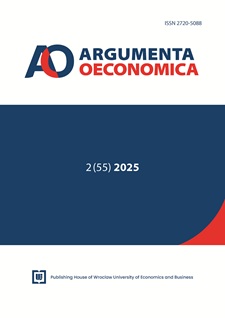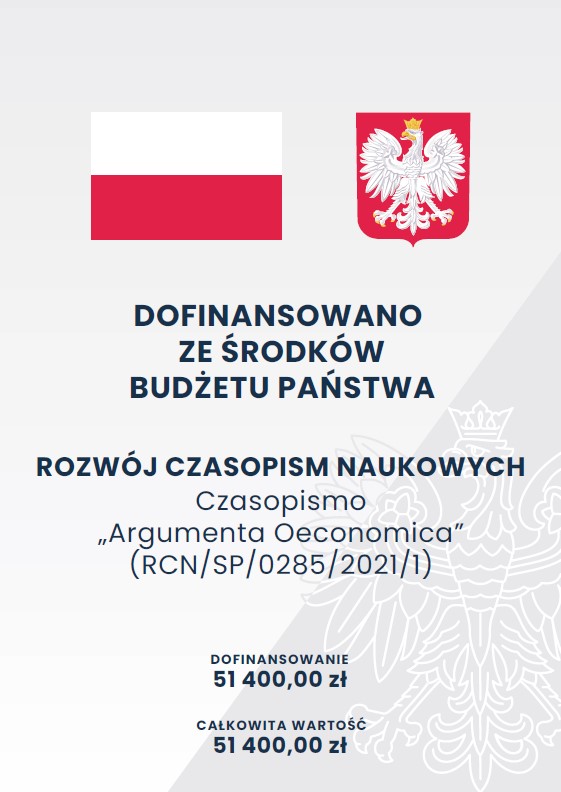Does inheritance taxation stimulate or hamper human capital accumulation?
DOI:
https://doi.org/10.15611/aoe.2025.2.13Keywords:
human capital, capital accumulation, bequest taxation, economic growth, inheritanceAbstract
Aim: The taxes imposed on inheritance can stimulate or hamper accumulation of human capital, but it is unclear which of these prevails.
Methodology: The study analysed the problem in the long run with the dynastic model using two approaches. In the first, human capital was approximated by wages, whilst in the second it constituted a separate production factor. The former refers to the complementarity between two types of capital, while the latter refers to the substitutability.
Results: If wages approximate human capital, the inheritance tax decreases human capital accumulation. If, however, it is a distinct production factor, then the tax does not affect the accumulation rate but positively impacts the ratio of human to physical capital.
Implications and recommendations: Inheritance taxation can stimulate labour-intensive and environmentally friendly production without harming economic growth if human and physical capital are the substitutes. Future research should involve the empirical verification of postulated results.
Originality/value: The authors explained theoretically why inheritance taxation sometimes hampers and sometimes stimulates human capital accumulation without referring to different capital accumulation models, but only to the complementarity or substitutability of various types of capital.
Downloads
References
Alonso-Carrera, J., Caballé, J., & Raurich, X. (2012). Fiscal policy, the composition of intergenerational transfers, and income distribution. Journal of Economic Behavior and Organization, 84(1), 62-84. https://doi.org/10.1016/j.jebo.2012.07.013
Caballé, J., & Santos, M. S. (1993). On the endogenous growth with physical and human capital. Journal of Political Economy, 101, 1042-1067. https://doi.org/10.1086/261914
Claro, S. (2003). A cross-country estimation of the elasticity of substitution between labor and capital in manufacturing industries. Cuadernos de Economía, 40(120), 239-257. https://doi.org/10.4067/S0717-68212003012000003
Dias, J. & Tebaldi, E. (2012). Institutions, human capital, and growth: The institutional mechanism. Structural Change and Economic Dynamics, 23(3), 300-312. https://doi.org/10.1016/j.strueco.2012.04.003
Eftimoski, D. (2022). On the inconclusive effect of human capital on growth: A new look at extended specifications. Economic Analysis and Policy, 76, 708-727. https://doi.org/10.1016/j.eap.2022.09.012
Farhi, E., & Werning, I. (2010). Progressive estate taxation. The Quarterly Journal of Economics, 125(2), 635-673. https://doi.org/10.1162/qjec.2010.125.2.635
García-Miralles, E. (2020). The crucial role of social welfare criteria and individual heterogeneity for optimal inheritance taxation. The B. E. Journal of Economic Analysis and Policy, 20(2), 1-16. https://doi.org/10.1515/bejeap-2019-0274
Grüner, H. P., & Heer, B. (1994). Taxation of income and wealth in a model of endogenous growth. Diskussionsbeiträge ─ Serie II. 227, Universität Konstanz, Sonderforschungsbereich 178 ─ Internationalisierung der Wirtschaft, Konstanz.
Hamaaki, J. & Ibuka, Y. (2024). The effect of inheritance receipt on labor supply: A longitudinal study of Japanese women. The B. E. Journal of Economic Analysis & Policy, 24(4), 1259-1305. https://doi.org/10.1515/bejeap-2022-0412
Hedlund, A. (2020). Estate taxation and human capital with information externalities. Macroeconomic Dynamics, 24(3), 568-600. https://doi.org/10.1017/S1365100518000366
Hendricks, L. (2003). Taxation and the intergenerational transmission of human capital. Journal of Economic Dynamics and Control, 27(9), 1639-1662. https://doi.org/10.1016/S0165-1889(02)00074-X
Holtz-Eakin, D., Joulfaian, D., & Rosen, H. S. (1993). The Carnegie conjecture: Some empirical evidence. The Quarterly Journal of Economics, 108(2), 413-435.
Ihori, T. (1997). Taxes on capital accumulation and economic growth. Journal of Macroeconomics, 19(3), 509-522. https://doi.org/10.1016/S0164-0704(97)00026-8
Ihori, T. (2001). Wealth taxation and economic growth. Journal of Public Economics, 79(1), 129-148. https://doi.org/10.1016/S0047-2727(00)00098-0
Karabarbounis, L., & Neiman, B. (2014). The global decline of the labor share. The Quarterly Journal of Economics, 129, 61-103. https://doi.org/10.1093/qje/qjt032
Kindermann, F., Mayr, L., & Sachs, D. (2020). Inheritance taxation and wealth effects on the labor supply of heirs. Journal of Public Economics, 191, 104127. https://doi.org/10.1016/j.jpubeco.2019.104127
King, R. G., & Rebelo, S. (1990). Public policy and economic growth: Developing neoclassical implications. Journal of Political Economy, 98, s126-s150. https://doi.org/10.1086/261727
Knoblach, M., Roessler, M., & Zwerschke, P. (2020). The elasticity of substitution between capital and labour in the US economy: A meta-regression analysis. Oxford Bulletin of Economics and Statistics, 82, 62-82. https://doi.org/10.1111/obes.12312
Kudła, J. (2004). Wpływ opodatkowania na akumulację kapitału ludzkiego. Ekonomista, 5, 635-653.
Kulp, C. W., Kurtz, M., Hunt, C., & Velardi, M. (2023). The distribution of wealth: An agent-based approach to examine the effect of estate taxation, skill inheritance, and the Carnegie Effect. Journal of Economic Interaction and Coordination, 18, 397-415. https://doi.org/10.1007/s11403-022-00372-7
Mućk, J. (2017). Elasticity of substitution between labor and capital: Robust evidence from developed economies. NBP Working Paper No. 271.
Piketty, T. (2011). On the long-run evolution of inheritance: France 1820-2050. The Quarterly Journal of Economics, 126(3), 1071-1131. https://doi.org/10.1093/qje/qjr020
Piketty, T., & Saez, E. (2013). A theory of optimal inheritance taxation. Econometrica, 81(5), 1851-1886. https://doi.org/10.3982/ECTA10712
Staffolani, S., & Valentini, E. (2007). Bequest taxation and efficient allocation of talents. Economic Modelling, 24(4), 648-672. https://doi.org/10.1016/j.econmod.2006.12.006
Downloads
Published
License
Copyright (c) 2025 Maciej Dudek, Robert Kruszewski, Janusz Kudła, Konrad Walczyk

This work is licensed under a Creative Commons Attribution-ShareAlike 4.0 International License.
Accepted 2025-01-25
Published 2025-11-04








